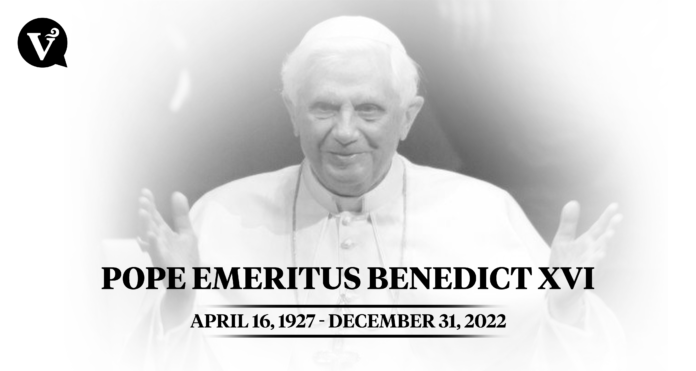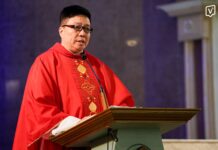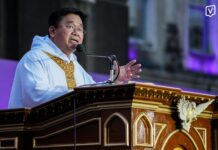Pope Emeritus Benedict XVI, a German theologian who was the first Supreme Pontiff in nearly six centuries to resign from the papacy, died on Saturday, Dec. 31, at his residence in the Vatican. He was 95.
Matteo Bruni, a Vatican spokesman, confirmed Benedict’s death in a statement. Pope Francis on Wednesday had sought prayers for his predecessor, who he said was “very ill.”
In a statement, Catholic Bishops’ Conference of the Philippines president Bishop Pablo David thanked the support of Catholics and said that the Pope Emeritus would be remembered as a “Pope of Charity,” a great theologian, a catechist, and a musician.
“He spent the last years of his life as an emeritus pope in solitude and contemplation, supporting the universal Church and Pope Francis spiritually with his prayers. Let us commend him to the Lord and pray for his eternal response,” the Caloocan bishop said.
Hours before he passed away, the Pope Emeritus was said to be “lucid and alert,” but his health had deteriorated due to old age and loss of stamina.
Joseph Alois Ratzinger was elected the 265th pope on April 19, 2005 to succeed Pope John Paul II, who died after a 26-year reign, and was the first German to hold the title in a half millennium. The former archbishop of Munich and Freising was the oldest pope to lead the Church since 1730, at the age of 78.
Benedict was lauded for defending Catholic doctrine and values amid the wave of secularism and moral relativism sweeping the West.
He issued three encyclicals during his nearly eight-year tenure, tackling Christian love, hope and the state of the global economy amid the financial crisis: Deus Caritas Est (2006), Spe Salvi (2007) and Caritas in Veritate (2009).
Benedict was the first Pontiff to meet with the families of clergy sex abuse victims in 2008 in the United States. In March 2010, he offered an eight-page apology to Irish Catholics, saying Church leaders there had committed “grave errors of judgment and failures of leadership.”
Despite Benedict’s condemnation of what he had called the “filth” in the Church, critics assailed his response, noting that he didn’t discipline clerics who were involved, even though he was prefect of the Congregation for the Doctrine of the Faith from 1982 to 2005.
Benedict declared a Jubilee Year from January 2011 to January 2012 to mark UST’s Quadricentennial, describing it as “a significant event in the life of the Church.”
“I am confident that keeping in mind the faith and the reason, which are always part of a truly integrated approach to education, the University will continue to contribute to the intellectual, spiritual, and cultural enrichment of the Philippines and beyond,” the Supreme Pontiff said in a recorded message on April 28, 2011.
More than a year later, on October 21, 2012, he canonized the Visayan catechist Pedro Calungsod at the Vatican, giving the Philippines its second saint.
Benedict shocked the world when he abdicated in 2013 due to “advanced age.” The unprecedented move was the first to be witnessed in modern times since the resignation of Pope Gregory XII in 1415.
“After having repeatedly examined my conscience before God, I have come to the certainty that my strengths, due to an advanced age, are no longer suited to an adequate exercise of the Petrine ministry,” he said in his resignation letter.
UST Central Seminary Rector Fr. Quirico Pedregosa Jr., O.P. told the Varsitarian at the time that Benedict’s decision should be given “respect,” as it was the result of careful examination.
“He is a person who thinks and prays a lot. He recognized that he does not have the strength adequate to lead the Church, so we have to respect his decision as an expression of his own integrity,” he said.
Cardinal Jorge Mario Bergoglio, an Argentine Jesuit, was selected by the papal conclave to succeed Benedict, and took the name Francis.
The Pope Emeritus spent his retirement years at the Mater Ecclesiae Monastery inside the Vatican.
Pope Francis will preside over Benedict’s funeral Mass on Thursday, Jan. 5, at St. Peter’s Basilica. Justin Benedict T. Lim












